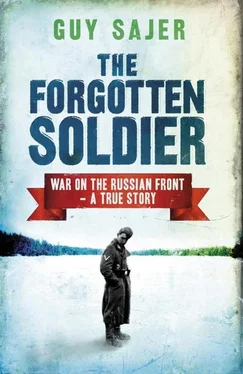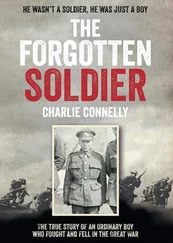Their only response is to stop sawing and straighten up, and I guess that they are smiling behind their heavy beards. One of them is a tall, strapping fellow; the other two are short and stocky. I ask two or three questions, but get no reply. These characters must be laughing at me! Then I hear footsteps coming up behind me, and a voice says: “Let them alone. You know that talking to them is forbidden, except to give them orders.”
“Those wild men didn’t answer me anyway. I was just wondering what the hell they’re doing in the Wehrmacht.”
“Teufel!” says the fellow who’s come to dress me down. “I can see now that you’ve never been under fire. Those fellows are Russian prisoners. And if you ever do get to the front and you see one of them before he sees you, fire without hesitation, or you’ll never see another.” I am astounded, and look again at the Russians, who have resumed their sawing. So those are our enemies, who shoot at German soldiers, soldiers wearing uniforms like mine. Why did they smile at me then?
For the next two weeks, life in the castle with my companions of the 19th Company continues as usual, and I obliterate the memory of the 27th, which seemed to be composed entirely of sullen, gloomy characters. To be fair, however, I must admit that the men in the 27th have been in service since 1940.
Winter has arrived, with its snow and rain, transforming the earth into sticky glue. When we come in at dusk we are covered with mud and exhausted, but still filled with the sense of joy that comes from youth and health. These small fatigues are nothing compared to what awaits us. Every evening we warm ourselves in our comfortable beds, and joke until sleep interrupts us.
October 28. The weather, which is not very cold, is nonetheless frightful. Gray clouds and squalls of wind and rain fill the sky for twenty-four hours a day. Our noncoms are tired of getting soaked to the skin, and have given up taking us to outdoor exercises. We spend most of the time perfecting our skills as drivers and mechanics. I don’t yet know anything more disagreeable than rummaging through an engine under a driving rain.
The thermometer remains more or less constant at freezing. October 30: raining and cold.
After saluting the colors, we are ordered to the supply store, where we proceed without thinking about explanations. At least it will be warm in there. In the store, which has been set up in a large shed, the first two sections of our company have just been served, and are coming out with their arms loaded. When it’s my turn, I am given four boxes of sardines, stamped in France, two vegetable sausages wrapped in cellophane, a package of biscuits enriched with vitamins, two slabs of Swiss chocolate, some smoked lard, and a half pound of lump sugar. Four steps further on, another attendant piles onto my already encumbered arms a waterproof ground sheet, a pair of socks, and a pair of woolen gloves. At the door one more item is added: a cloth packet inscribed FIELD KIT: FIRST AID. In the falling rain, I rejoin my group, which is clustered around an officer crouched on the back of a truck. He is well protected in his long coat of gray-green leather, and seems to be waiting for the entire company to assemble. When he judges that everyone has arrived, he begins to speak. He talks so quickly that I have a hard time understanding what he says.
“You will be leaving this billet to convoy several military trains to a more advanced post. You have just been issued with supplies for eight days, which you will now include in your equipment. You will assemble in twenty minutes. Now get ready.”
Quickly, silent with anxiety, we return to our quarters and gather together our possessions. As I fasten my pack to my back, my neighbor in the next bed asks: “How long will we be gone?”
“Don’t know.”
“I just wrote to my parents and asked them to send me some books.”
“The P.O. will forward your package.”
At that moment Hals, my enormous friend, hits me across the back. “At last we’ll see some Russians,” he shouts, grinning sardonically.
I sense that he is trying to build up his nerve. In reality everyone feels considerable emotion. Despite our perfect innocence, the idea of war terrifies us.
Once more we find ourselves standing in the courtyard in that damned rain. We are each given a registered Mauser and twenty-five cartridges. I don’t know if it’s a reaction to receiving these arms, but I notice that everyone is turning pale. Certainly we can all be excused for this: no one in the company is more than eighteen. I myself won’t be seventeen for another two and a half months. The lieutenant notices our confusion, and to raise our spirits reads us the latest Wehrmacht communiqué. Von Paulus is on the Volga, von Richthofen is near Moscow, and the Anglo-Americans have suffered great losses in their attempts to bomb the cities and towns of the Reich. Our officer seems reassured by our answering cries of “Sieg Heil.” The entire 19th Company stands at attention in front of the flag.
Laus, our feldwebel, is there, also helmeted and fully equipped. At his side he carries a long automatic in a black leather sheath, which gleams in the rain. We are all silent. The order to move out sounds like the abrupt blast of an express train’s whistle: “Achtung! Rechts um. Raus!”
In threes, we leave the place which was home during our first army experiences. We cross the stone bridge for the last time, and set off down the road which brought us here a month and a half ago.
I look back several times at the imposing gray mass of the ancient Polish castle which I shall never see again, and would have succumbed to melancholy if the presence of my comrades had not raised my spirits. We arrive at Bialystok, a sea of green uniforms, and march to the station.
PART ONE
RUSSIA
Autumn, 1943
Minsk — Kiev — Baptism of Fire — Kharkov
We were standing beside a long railway convoy. We had been ordered to stack our guns on the tracks and take off our packs. The time was somewhere between twelve noon and one o’clock. Laus was munching on something he had taken from his pack. His face, although scarcely attractive, had grown familiar to us, even reassuring. As though his action were some kind of signal, we all took out our food, some immediately devouring the equivalent of two meals. Laus noticed this, but contented himself with a brief comment: “All right, go ahead, gobble it all down. But there won’t be another distribution before the week is over.”
Although we all felt as if we’d eaten only half of what we really needed to assuage our giant appetites, we also felt a little bit warmer. By this time we had been waiting in the cold for more than two hours, and it was beginning to get the better of us. We tramped up and down, joking and stamping our feet. Some, who had paper, wrote letters, but my fingers were too numb, and I contented myself with observation. Trains loaded with war materiel were continuously passing through the station, which had turned into a vast bottleneck, with cars backed up for at least six hundred yards. Everything seemed very badly organized, with convoys moving out, only to be shuttled onto other sections of track, where other companies brought from God knows where were being kept waiting as we were. People were always moving out of the way to let a train go by, only to see it a few minutes later headed in the opposite direction. What a mess!
The train we were leaning against seemed to have been immobilized for eternity. Perhaps it would have been bitter if it had never left.
To give myself some exercise, I hoisted myself up as high as the air holes in the carriages. Instead of cattle, the train was filled with munitions.
Читать дальше












